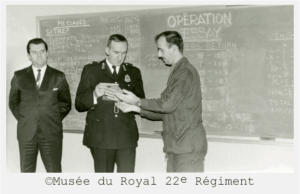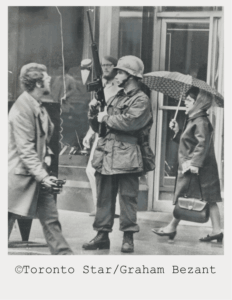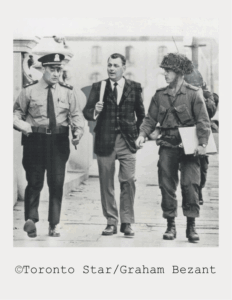Our October
The kidnappings of James Richard Cross and Pierre Laporte set in motion the largest peace-time deployment of the Canadian Army on domestic soil. Jean Drapeau, the mayor of Montreal, and Robert Bourassa, the premier of Quebec, asked for federal assistance to maintain public order and to stop the FLQ. The federal response was two-fold: military deployment and invocation of the War Measures Act.
But who exactly were these soldiers who were deployed to the four corners of Quebec? They were individuals just doing their jobs, soldiers who were asked to come forward to guard a city against their fellow citizens, against people who spoke the same language as them, against young people their own age, who may have grown up not far from them.
The army arrives
The soldiers’ mission was, in short, to support the police. With the invocation of the War Measures Act, each soldier had the powers of a constable. Their tasks were manifold: riot control, protection of government figures and other VIPs, patrolling for troublemakers, and participating in police cordons. Soldiers worked 12-hour days and moved around frequently, guarding a police station for a week and a government building or private residence the next.
Respect and Cooperation
While it might have seemed strange that the city was suddenly occupied by armed soldiers, most welcomed the army with a sigh of relief. Crime dropped while the soldiers were there, civilians paid for dinners and coffees, and children stared. In general, the welcome was overwhelmingly positive, even more so than during the Olympics six years later! There were, however, some who were surprised to see Francophone soldiers responding to a Francophone crisis.
The Role of the Press
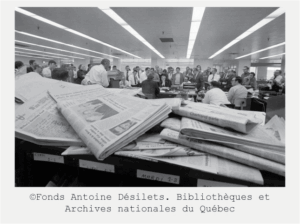 In any democratic society, the media play an important role in not only informing the public but also challenging government decisions. Journalists’ investigative work has repeatedly shone a light on events otherwise shrouded in obscurity. The 1970 October Crisis was no exception. First, the media played a crucial role in reassuring the public about the Canadian army on the streets. This is why soldiers were seen as the saviours of a country in crisis.
In any democratic society, the media play an important role in not only informing the public but also challenging government decisions. Journalists’ investigative work has repeatedly shone a light on events otherwise shrouded in obscurity. The 1970 October Crisis was no exception. First, the media played a crucial role in reassuring the public about the Canadian army on the streets. This is why soldiers were seen as the saviours of a country in crisis.
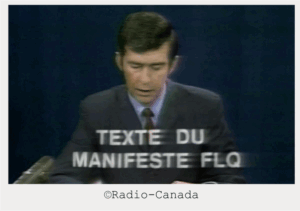 The media played a special role in events that October. They conveyed information for the FLQ, as they agreed to release their manifesto as is, without comment or analysis. For some, this neutral reading was the reason many people started joining the movement, as they identified with what the FLQ described.
The media played a special role in events that October. They conveyed information for the FLQ, as they agreed to release their manifesto as is, without comment or analysis. For some, this neutral reading was the reason many people started joining the movement, as they identified with what the FLQ described.
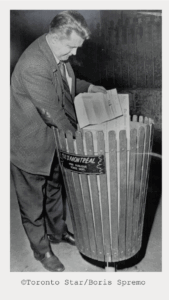 The organization’s cells also used the media to communicate with each other. They used competition between radio stations to boost the popularity of their statements. Journalists got quickly caught up in the game and were constantly looking for new developments or new information from the kidnappers. The October crisis was one of the first continuous news cycles in Canada, and some even say that it was the birth of investigative journalism in Quebec.
The organization’s cells also used the media to communicate with each other. They used competition between radio stations to boost the popularity of their statements. Journalists got quickly caught up in the game and were constantly looking for new developments or new information from the kidnappers. The October crisis was one of the first continuous news cycles in Canada, and some even say that it was the birth of investigative journalism in Quebec.
However, journalists also made mistakes. They circulated misinformation, for example, that cannons were being brought into Montreal (even though the soldiers were just being followed by simple trailers!). Some argue that an inter-cell communiqué about how the FLQ was abandoning their threat to execute prisoners was intercepted and therefore not circulated in time to prevent Pierre Laporte’s death.

